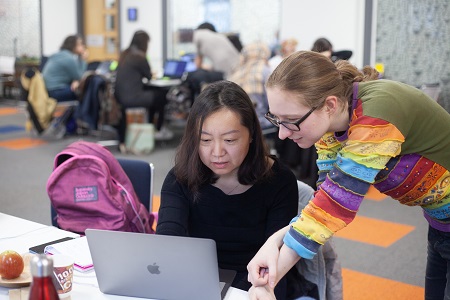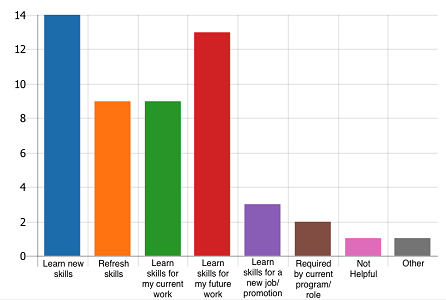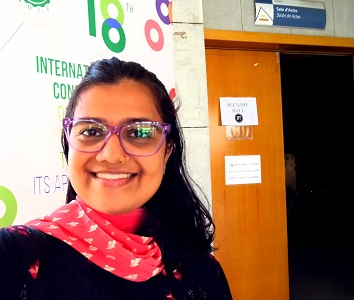HPC training workshop for underrepresented groups
Posted on 20 March 2020
HPC training workshop for underrepresented groups
 Image courtesy of event organisers
Image courtesy of event organisersBy Software Sustainability Institute Fellow Mozhgan Kabiri Chimeh (NVIDIA), Anna (Ania) Brown (University of Oxford, University of Southampton), Fouzhan Hosseini (NAG), Weronika Fillinger (EPCC) and Neelofer Banglawala (EPCC)
In a male-dominated field such as High-Performance Computing (HPC), it is vital to ensure women and minorities advance equitably in their careers. Bringing women and underrepresented groups together and improving visibility is a step towards promoting diversity and inclusion.
Conferences such as WHPC summit 2020, workshops such as Women in HPC workshop at ISC20, tutorials and training events targeting underrepresented groups are various activities that aim to close the gender gap in HPC. One important step towards making this happen is to facilitate developing the HPC skills among underrepresented groups. Training is a crucial step to encourage a diverse and inclusive workforce in HPC communities.
We, five female HPC experts with a long track record of providing HPC training, came together to run an introduction to HPC workshop for a female audience. On January 30 - 31 we ran our first joint HPC training workshop at the University of Sheffield, UK. This was an intensive two-day introductory course on how to use HPC systems efficiently, aimed at PhD students and postgraduate researchers.
The event was sponsored by N8 CIR (N8 Centre of Excellence in Computationally Intensive Research) and ran in collaboration with Women In HPC (WHPC) organisation and the Software Sustainability Institute.
Scope of the workshop
Over the last decade, HPC resources have become widely accessible to researchers. They have moved from being out-of-reach to most, to ubiquity. However, many researchers still do not use HPC resources for the simple fact that they do not know how to use these systems. The main objective of this workshop was to help participants develop the necessary skills and build the confidence to make use of HPC resources in their everyday work. To achieve this we covered:
-
motivations for using HPC in research,
-
how HPC systems are put together and how they differ from desktops/laptops,
-
how to connect to remote HPC systems and transfer data,
-
use of a job scheduler to work on a shared system,
-
use of software modules to access different HPC software, and
-
how to work effectively on a remote shared resource.
In addition, attendees were given access to the CIRRUS computer system from EPCC which they used for running exercises during the workshop. This helped them to get a real feel for working on a HPC system.
Workshop atmosphere
The workshop had twenty-four participants. The attendees were female researchers and university staff including twelve PhD students, four early-career/post-graduate researchers, one lecturer, one senior research software engineer and one IT Support Services technician. They came from different UK universities, mostly in the north of England, and from various disciplines with not much overlap in their field of research. What they had in common was the need to use HPC systems.
This workshop had an exceptional atmosphere. It was light and friendly and, in the words of one of our attendees, a great environment to learn in. The instructors talked openly about their experience in using HPC, sharing mistakes, frustrations, and joys. They continuously encouraged questions, and made sure that no question was treated as too basic or too complicated for the training level of the workshop. In addition, having five instructors allowed for great availability of help and support throughout the workshop.
We managed to create a safe zone where participants felt comfortable trying to working on a HPC system, overcoming their fear of breaking a shared system, and to raise their hands and ask for help when support was needed. Experienced female instructors, and the fact that the workshop was run primarily for female and underrepresented groups in HPC, helped us to create this relaxed and welcoming atmosphere.
Outcome and future plans
The workshop was a great success. We received a lot of positive feedback during the workshop. In our post-workshop survey, 89% of participants said that they felt more confident in using remote High Performance Computing facilities effectively in their work. The following graph summarises their responses on how attending this workshop helped them (19 responses in total).

Encouraged by the success and impact of this workshop, we plan to run regular HPC training workshops in the UK; one introductory and one advanced workshop per year. Stay tuned!
Testimonials from workshop attendees
Charlotte Smith
 Photo courtesy of Charlotte Smith
Photo courtesy of Charlotte SmithI am a PhD student at Lancaster University researching secondary forest growth in the Brazilian Amazon as part of the Envision DTP. My project involves working with very large land cover datasets which are challenging (and painfully slow!) to process using a laptop. Instead I have been using the Lancaster University High-End Computing (HEC) system to conduct my analysis but with very little understanding of how it works or what is possible. Attending the HPC Carpentry workshop has given me an understanding of how cluster computing works and confidence that I have been using HEC correctly. I have come away with new ideas on how to progress with my work and how to improve the efficiency of some of my current scripts. This course goes back to basics and I would recommend it to anyone who is starting out with HPC.
Lisa Genochio
Currently a first-year PhD student at the University of York in Palaeoanthropology (Paleohub department), I followed this workshop in order to learn new skills and to be able to apply them in my future work. Indeed, I will use an HPC during my PhD to calculate the impact of the masticatory process during development in our species and Neanderthal. To do that, I will create a 3D growth model and, using different software, I will simulate bite forces. Thus, learning bash language as well as the way to send a job to HPC is important for my work. I would like to thank the staff who were present during these two days. Everyone was very friendly and the lessons were clear and of high quality.
Emma James
 Photo courtesy of Emma James
Photo courtesy of Emma JamesI’m a Research Fellow in Psychology at the University of York. Up until recently, my statistical analyses have worked with relatively small datasets collected from experiments, but my current research interests involve testing similar hypotheses in large-scale naturally occurring datasets. These analyses are much more computationally intensive, but I had no experience with accessing HPC systems and found the documentation daunting. This workshop provided an accessible introduction to how HPC systems work, in a non-intimidating and inclusive environment. I still have some learning to do, but I now have the confidence to reach out to my university support team and understand how to ask the right questions. The instructors and fellow attendees were very supportive, and made it a thoroughly enjoyable two days—thank you!
Emma Stubington
 Photo courtesy of Emma Stubington
Photo courtesy of Emma StubingtonI’m an Impact Research Associate at STOR-i, Lancaster University. By applying operational research and statistical techniques I hope to tackle a variety of healthcare related problems. Currently my main focus is on radiotherapy treatment planning for prostate cancer and head and neck cancer. I attended the HPC Carpentry workshop to relearn how to use shell scripting and connect to HPC systems. After about four years of not using them I was scared to try again and this workshop gave me the perfect opportunity to re-learn in a safe friendly environment. Mozhgan, Fouzhan, Weronika, Neelofar and Ania were all great, happy to answer any question and made sure everyone understood. I cannot thank them enough. I now have the confidence to use this in my research and after a four-year hiatus have logged back onto the University HEC. Thanks.
Manasi R Mulay
 Photo courtesy of Manasi R. Mulay
Photo courtesy of Manasi R. MulayI am a PhD student at University of Sheffield. My project aims to provide sustainable solutions to environmental problems via computational chemistry and green chemistry routes.
Attending HPC carpentry workshop was really useful for me to develop my HPC skills further. The success of the workshop lies in efforts by all organisers and facilitators making sure that everyone is following with the instructor's pace. They were very helpful in answering the individual queries. Another key highlight of the workshop was well-prepared study material on github by Dr. Brown. This did not only help the beginners for how to start but also explained the fundamentals to the existing HPC users. In the concluding remarks of the workshop, everyone was reminded about their responsibilities on shared HPC facilities, which was very much necessary to make the most of the HPC facilities yet being considerate of other users. I fully endorse such carpentry workshops and webinars for existing and new users in the future as well. (PS: organisers were so kind that they took care of my vegan dietary requirements even though I was the only vegan in the group. This kind gesture helped me to focus on the workshop even better.)
Aikaterini Chatzopoulou
 Photo courtesy of Aikaterini Chatzopoulou
Photo courtesy of Aikaterini ChatzopoulouMy name is Katerina, and I am a PhD student at the University of Liverpool. My research study is focused on Bayesian Inference and Gaussian Processes, and it is in collaboration with the IBM Research laboratory. I attended the HPC Carpentry workshop to familiarise myself with the concept and use of high-performance computing (HPC). The schedule of the workshop was well structured, the presentations were extremely understandable, and to the point. I really appreciated the insight that was provided, and the time the instructors took following the session to provide additional feedback. Through this workshop, I gained hands-on experience on how to connect to a remote server and use HPC. Consequently, I managed to take advantage of the HPC services provided by the University of Liverpool and progress further with my research. In the future, I would be keen on attending a more advanced workshop that would exploit more HPC aspects. I highly recommend this workshop to those that want to start using HPC but have little or no knowledge in this area.
Khunsa Fatima
 Photo courtesy of Khunsa Fatima
Photo courtesy of Khunsa FatimaI am a first-year PhD student at Newcastle University and my research topic is “Integrated Sensing Technologies for Rapid Tree Health Assessment”. In my research, I would use a number of remote sensing ground-based sensors to monitor and assess tree health and will develop a semi-automated workflow using Python to classify tree severity. As this whole process will involve complex processing and computation, I ended up attending the HPC Carpentry workshop.
Both days of the workshop were really productive in term of material, lectures delivery, and eagerness of instructors to explain and clarify ambiguities. By the end of the workshop, I am quite confident in working on an HPC system. I am optimistic that the skills acquired in this workshop will help me in my research. I feel indebted to say ‘Thank You’ to all instructors. I highly recommend this workshop to those who wish to learn about HPC.
Lenshina Mpeyako
I am a First Year PhD student at Newcastle University. I attended my first HPC course in Edinburgh but I went off feeling a bit frustrated. I would say this course laid down a beautiful foundation for my future endeavours. If I didn’t get it the first time, I must confess that I did this time. I actually loved the energy of the instructors and their method of delivery was just perfect – not intense or too serious but informative and fun-filled.
I really want to thank these wonderful women who devote their time and effort to make a positive change in the lives of other women. I look forward to other exciting events!
Final words
Course materials can be found here. If you would like to know more about future events (workshops and events), please join the WHPC mailing list.

